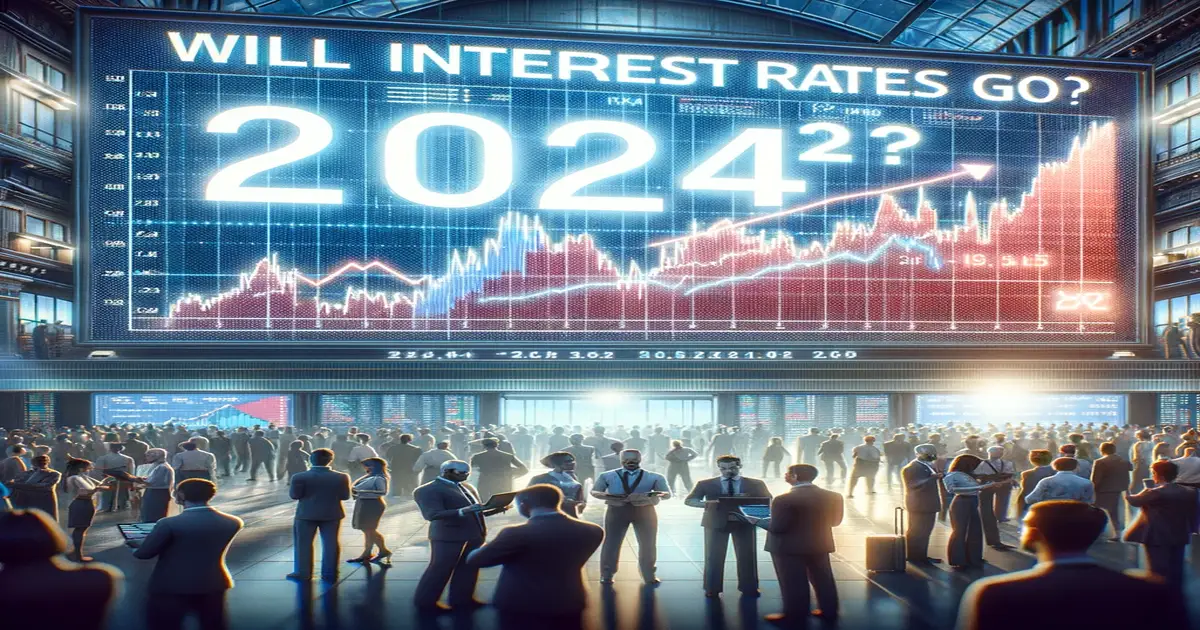Curious about Will Interest Rates Go Up in 2024? Interest rates in 2024 will depend on various economic factors. They are difficult to predict with certainty. However, economists’ current trend and consensus suggest interest rates could increase in 2024.
Economic indicators, such as inflation, GDP growth, and central bank policies, will significantly influence the direction of interest rates. The global economy is recovering from the COVID-19 pandemic. Central banks may gradually increase rates to prevent overheating and ensure stability.
However, it is advisable to closely monitor economic developments. Consult with financial experts to make informed decisions in the future. You can discuss borrowing, investing, or saving.
The Historical Trend Of Interest Rates
Understanding the historical trend of interest rates is vital for anticipating future changes. We can gain insights into what drives these changes by analyzing past interest rate movements. Additionally, we can understand how they may impact us moving forward.
Here, I share the historical fluctuations of interest rates. I will also discuss the factors that have influenced them in the past.
Past Interest Rate Movements
Over the years, interest rates have shifted significantly. However, this has impacted various sectors of the economy.
Let’s take a closer look at some of the notable movements in interest rates:
Factors Influencing Interest Rates In The Past
Various factors have been crucial in influencing interest rate fluctuations throughout history. To comprehend the driving forces behind interest rate changes, it’s essential to consider these factors.
Here are some key factors to explore:
- Economic conditions: Economic indicators such as inflation, GDP growth, and unemployment can influence interest rates.
- Central bank policies: Monetary policies implemented by central banks can substantially impact interest rates. Decisions relating to lending rates and money supply can directly influence borrowing costs for individuals and businesses.
- Market forces: Supply and demand dynamics within the financial market can also affect interest rates. If the demand for credit is high and the supply is limited, interest rates will likely increase.
- Government actions: Government actions like taxation and government spending can indirectly impact interest rates. They do this by affecting economic conditions and market confidence.
- Global influences: International factors can affect interest rates by impacting financial markets. These factors include geopolitical events, exchange rates, and global economic trends.
Knowing these things helps us. What will happen to interest rates in the future? Also, we can get ready for any changes in interest rates. We watch economic signs closely. We keep an eye on what central banks do. And we stay updated on market trends and world events.
Current Economic Conditions

To assess the likelihood of interest rates going up in 2024, it’s crucial to analyze the current global and domestic economic conditions.
Global Economic Factors
Several global economic factors can influence interest rates in individual countries. One such factor is the performance of major economies around the world. The key players in the global economy, including the United States, China, and the European Union, significantly impact interest rate decisions.
Trade relations between these major economies also influence interest rates. Tariffs and trade disputes can create uncertainty and volatility. These can affect interest rates. Also, global events, like geopolitical tensions and natural disasters, can ripple into the worldwide economy. This can lead to changes in interest rates.
Domestic Economic Indicators
Domestic economic indicators are crucial. They determine the direction of interest rates within a country. These indicators include inflation rates, employment data, and GDP growth. Central banks are more likely to raise interest rates when the economy is growing steadily with low inflation and high employment rates.
On the other hand, if inflation is high and unemployment rates are rising, central banks may be inclined to lower interest rates. However, this affects investor confidence and borrowing costs.
| Economic Indicator | Impact on Interest Rates |
|---|---|
| Inflation | If inflation is high, central banks may raise interest rates to curb it. |
| Employment Data | Low unemployment rates can lead to higher interest rates as the demand for credit increases. |
| GDP Growth | Strong GDP growth may signal a need for higher interest rates to prevent an overheating economy. |
Policymakers and investors must closely monitor these domestic economic indicators. They need to anticipate potential changes in interest rates in 2024.
Projections And Predictions
Projections and predictions about interest rates in the year 2024 are essential. They help individuals and businesses make informed decisions about their financial strategies.
Let’s check the expert opinions, market analysis, and government forecasts. We’ll understand the possible scenarios regarding interest rate fluctuations in 2024.
Expert Opinions
Experts in finance and economics have been closely monitoring various indicators. They are predicting the trajectory of interest rates in 2024. While opinions may differ, most experts agree that the expectation is for interest rates to undergo some changes in 2024.
An expert from a top financial institution suggests that interest rates could gradually rise throughout the year. However, this is due to improving economic conditions. Another expert predicts a more stable interest rate environment. They cite factors such as inflation expectations and fiscal policies.
Expert opinions can vary. Their predictions are based on extensive research and analysis of historical data. They consider prevailing market conditions and macroeconomic factors. As such, they serve as valuable insights but are not definitive forecasts.
Market Analysis
Market analysis identifies trends and provides valuable information for predicting interest rate movements. It plays a significant role. Analysts gain insights into possible 2024 interest rate directions by examining economic indicators. For example, they look at GDP growth, employment rates, and inflation.
Recent market analyses suggest that interest rates might increase in 2024. However, the pace and magnitude of these increases are subject to various factors. These factors include global economic conditions, geopolitical events, and monetary policy decisions by central banks.
Government Forecasts
Government institutions, such as central banks and finance ministries, release official forecasts about interest rates. These forecasts are based on comprehensive assessments of the economy. They are crucial in shaping monetary policies and regulatory measures.
According to government forecasts, interest rates in 2024 may undergo slight adjustments. However, this will be based on economic priorities and objectives. Examples include managing inflation, stimulating economic growth, and supporting financial stability.
However, it is essential to remember that government forecasts are subject to revision. The economic landscape evolves. External factors, such as changes in trade policies or unexpected events, may lead to revisions in interest rate projections.
Potential Impact On Various Sectors
The potential impact on various sectors can be quite diverse, depending on the specific factors or changes.
Here’s a brief overview of how different sectors might be affected:
Housing Market
Interest rate increases in 2024 could significantly impact the housing market. Higher interest rates mean that borrowing costs would also rise. Therefore, this would make it more expensive for people to buy new homes or refinance their existing mortgages.
However, this could lead to a slowdown in the housing market. People might hesitate to take on more extensive financial commitments. They might do this when faced with higher monthly payments.
Investments And Finance
The rise in interest rates can also affect investments and finance. Investors may find bonds and other fixed-income investments more attractive. They offer higher returns than low-interest-rate environments.
On the other hand, this could mean a decrease in demand for riskier investments like stocks, as the cost of borrowing for companies may increase. Higher interest rates could impact the profitability and loan demand of financial institutions. They might also face challenges.
Consumer Spending
The potential increase in interest rates in 2024 can directly affect consumer spending habits. Higher borrowing costs can lead to reduced access to credit. This could minimize consumer purchases of big-ticket items such as cars, appliances, and furniture.
Higher interest rates may also impact disposable income. Individuals may need to allocate more money towards debt payments. They may need to do this rather than spending on non-essentials.
However, this could slow economic growth as consumer spending drives the economy forward.
Overall, the rise in interest rates in 2024 has the potential to impact various sectors. The housing market may slow down. Investments and finance might be influenced. Consumer spending could decrease.
Individuals and businesses need to stay informed. They should adapt their strategies accordingly to navigate potential changes effectively.
Strategies For Managing Higher Interest Rates

As 2024 approaches, many wonder if interest rates will keep rising. Predicting the future is difficult. However, it’s always good to be prepared for potential changes.
Let’s check some strategies for managing higher interest rates. They include refinancing options, saving and budgeting tips, and investment adjustments.
Refinancing Options
Refinancing your current loans can be smart when interest rates are on the rise. By refinancing, you can lock in a lower interest rate.
However, this could save you thousands of dollars in the long term. Consider exploring your refinancing options with multiple lenders. Find the best rates and terms that suit your financial situation.
Saving And Budgeting Tips
When interest rates go up, assessing your saving and spending habits becomes crucial.
Here are some tips to help you manage your finances effectively:
- Create a budget: To begin, track your income and expenses. This will give you a clear idea of how much you can save monthly. Use budgeting apps or spreadsheets to help you stay organized.
- Reduce unnecessary spending: Review your expenses. Identify areas where you can cut back. This might mean dining out less. It could also reduce entertainment expenses. Or shopping for deals and discounts.
- Build an emergency fund: Save some of your income for unexpected expenses. Try to save three to six months’ worth of living expenses. This will give you a safety net during uncertain times.
Investment Adjustments
When interest rates rise, it’s essential to reevaluate your investment strategy. Here are a few factors to consider:
- Review your portfolio: Evaluate your current investments. Determine if any changes are necessary. Think about spreading out your assets to lower risk. Also, explore investments that aren’t as affected by interest rate changes.
- Explore fixed-income options: When interest rates are rising, you should consider bonds and other fixed-income investments. These investments typically offer stable returns and can help balance your portfolio’s risk.
- Consult a financial advisor: If you’re dealing with changing interest rates, it can be helpful to get professional advice. A financial advisor can give you personalized recommendations based on your financial goals. They also consider how much risk you’re willing to take.
Implement these strategies to proactively manage the impact of higher interest rates on your finances. Remember to stay informed. Take proactive steps to adjust your financial plan. Also, it can help you navigate uncertain economic conditions more confidently.
Frequently Asked Questions For Will Interest Rates Go Up In 2024
Will Interest Rates Increase In 2024?
It is difficult to predict whether interest rates will increase in 2024. However, interest rates can be influenced by economic factors like inflation rates, government policies, and global financial conditions. However, it is advisable to stay informed about economic indicators and consult with financial experts for the latest updates.
What Are The Factors That Affect Interest Rates?
Several factors can impact interest rates. These include the state of the economy, inflation rates, central bank policies, government borrowing, and global financial conditions. These factors influence the supply and demand for credit. This, in turn, affects the interest rates set by lenders and banks.
How Can I Prepare For Potential Interest Rate Increases?
Consider evaluating your current financial situation to prepare for potential interest rate increases. Understand how your payments may change if you have variable interest rate loans. It may also be an excellent time to reassess your budget. You can reduce debt and consider fixed-rate financing options if available.
Stay informed about market trends and consult with financial advisors for personalized guidance.
Sum Up
It’s difficult to predict whether interest rates will go up in 2024. However, several factors suggest that there is a possibility of an increase. Economic growth, inflation, and monetary policies will all significantly influence interest rates.
As a wise investor, it’s essential to stay informed. Adapt your financial strategy accordingly to mitigate potential impacts. Monitor market trends closely and consult with financial experts to make informed decisions.

5 thoughts on “Will Interest Rates Go Up in 2024? Brace Yourself”